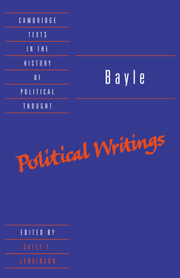Book contents
- Frontmatter
- Contents
- Acknowledgements
- A note on the translation
- List of abbreviations
- Introduction: a defence of justice and freedom
- Chronology
- Bibliography
- From Bayle's Dictionnaire historique et critique
- Project for a Critical Dictionary
- From Bayle's Dictionnaire historique et critique Bodin
- Brutus
- David
- Elizabeth
- Gregory
- Hobbes
- De l'Hôpital
- Hotman
- Japan
- Juno
- Loyola
- Machiavelli
- Mâcon
- Mariana
- Navarre
- Nicole
- Ovid
- Sainctes
- Sainte-Aldegonde
- Socinus (Marianus)
- Socinus (Faustus)
- Synergists
- Xenophanes
- Clarifications: On Atheists and On Obscenities
- Index
- Cambridge Texts in the History of Political Thought
Project for a Critical Dictionary
Published online by Cambridge University Press: 05 June 2012
- Frontmatter
- Contents
- Acknowledgements
- A note on the translation
- List of abbreviations
- Introduction: a defence of justice and freedom
- Chronology
- Bibliography
- From Bayle's Dictionnaire historique et critique
- Project for a Critical Dictionary
- From Bayle's Dictionnaire historique et critique Bodin
- Brutus
- David
- Elizabeth
- Gregory
- Hobbes
- De l'Hôpital
- Hotman
- Japan
- Juno
- Loyola
- Machiavelli
- Mâcon
- Mariana
- Navarre
- Nicole
- Ovid
- Sainctes
- Sainte-Aldegonde
- Socinus (Marianus)
- Socinus (Faustus)
- Synergists
- Xenophanes
- Clarifications: On Atheists and On Obscenities
- Index
- Cambridge Texts in the History of Political Thought
Summary
[In 1692 Bayle composed an essay to support his project for a critical encyclopaedia. It would aim, he said, to rectify the mistakes he had found in Moréri's dictionary. He addressed his proposal to Jacques du Rondel, a former colleague at Sedan, who had become professor of belles lettres at the university of Maestricht. The ‘Project’ shows that the idea of a dictionary of errors arises from Bayle's approach to scientific discovery; and from his perception that an accurate historical fact could serve to negate a false conjecture. For the scholar – whether historian or natural scientist – by being alert to evidence of mistakes in received thinking could often get nearer to the truth. Perhaps the essay inspired Mill's thoughts on poetry and pushpin: Bayle – citing the poet Malherbe's ironic rebuke – asks if the good poet should be thought less useful to the state than the good player at ninepins (p. 8).]
Dissertation
Which was printed as a foreword to some essays or fragments of this work in the year MDCXCII, under the title: Project for a Critical Dictionary to M. du Rondel, professor of belles lettres at Maestricht.
Sir,
You will doubtless be surprised at the resolution I have recently made.
- Type
- Chapter
- Information
- Bayle: Political Writings , pp. 1 - 16Publisher: Cambridge University PressPrint publication year: 2000



